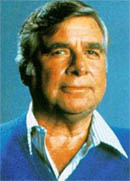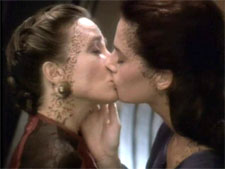June 13, 2005
A column tackling gay issues, gay themes, and just general gayness in television
Out-TakesThe Undiscovered Country
Where STAR TREK Got Straightened Out
"In the fifth season [of Star Trek: The Next Generation] viewers will see more of shipboard life [including] gay crew members in day-to-day circumstances."
 The tan man made a lot of promises. |
The show continued on for another 14 years, but continued on as though stuck in a time warp of its own, unable to move anywhere but over the same tired tracks when it came to issues of sex, gender and sexuality. The steps forward (Captain Janeway and SNAG-Luc Picard1) couldn't compete with the steps backward ("androgynous" characters consistently portrayed negatively and by women, everyone paired up in tidy heterosexual couples, Seven of Nine and T'Pol's constant competition to be the bone-thinnest woman in a skintight bodysuit ever portrayed on television), and I know I'm far from the only one who felt alienated by the space-age show's stone-age mentality. By the time Enterprise ended not with a bang but a whatever last month, most of us were long gone to greener, gayer, gynecologically friendlier pastures.
Now, whenever I start up on this rant, a dear friend of mine — who, admittedly, is far worthier of a Trekker than I shall ever be — tells me that I'm expecting way too much from the series. And so, I should explain up front that I hold Star Trek to a higher standard than I hold ... well, most other television, as well as most other science fiction — and I hold science fiction to a much higher standard than I do pretty much any other genre. To explain, let me flash back to my college years, where I actually took a class on science fiction, and we spent an entire semester reading and watching everything from Frankenstein to Invasion of the Body Snatchers to The Matrix, and taking it apart to see what the creator was trying to say. Even if unintentionally, science fiction is always saying something.
The beauty of science fiction is that it's a perfect vessel for commentary and critique because it has the ability to create other worlds in which contemporary problems can be re-cast free of pre-existing prejudices. Writing a historical novel with the punchline "Hey, dudes, fascism is bad" might have earned George Orwell a little notice; writing 1984 made him a superstar with a message that remains a relevant fable past its original historical context. The original Star Trek series similarly seized on its unique situation and got away with things no other show could have pulled off — a peaceable kingdom (or bridge, rather) where the Russians were our friends, allegories about race relations featuring no races ever found on Earth and the first interracial kiss on television2.
There are, in my experience, two kinds of space western science fiction: social commentary and fanboy candy. The two are not mutually exclusive, of course — Joss Wheedon's tragically short-lived Firefly kept up a healthy mix — nor is one necessarily better than the other — few would argue that Star Wars' latest turn for the politically conscious has done little for fans other than encouraging them to practice rolling their eyes more. But when you start off not only styling yourself as social commentary, but taking pride in your cutting-edge diversity — as Star Trek very much did — the slide back into the status quo is not only disappointing, it's just plain boring.
 Not quite a lesbian kiss |
Honestly? I'd be a lot more willing to let the no-queer-characters thing slide if the show itself weren't so consciously attentive to other aspects of diversity, particularly with regard to race and gender. Whether or not they've been successfully attentive is another matter entirely, but there has been effort toward making a diverse cast — I mean, we have people of all different colors and nationalities, girls and boys alike in important places, even a couple aliens and half-aliens running around the place, all put in to show what a multiplex of biological wonders the future will be. In a way, though, the vast diversity on all the other fronts makes any characters who are not essentially heteronormative more conspicuous by their absence.
| Guys, Dawson's Creek beat you to the punch. That's how bad it's gotten. |
And while you're at it, hire someone who can actually write. Geez.
1 Sensitive New Age Guy.
2And we can argue 'til the cows come home over whether or not that
was actually progressive or just for shock value — but it wasn't a same-sex
interracial kiss, so we'll have to argue somewhere that isn't this column.
Next time, on Out-Takes: The ambiguously gay Trek guest stars; or, Like Being Hit with a Qx4.
Email the author.
All written content © 2005 by the authors. For more information, contact homer@smrt-tv.com
